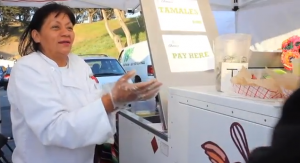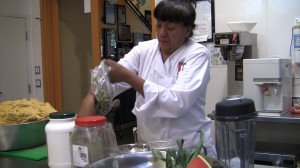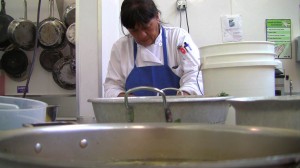
“Gracias, mi amor.”
It’s about 6 o’clock on a May evening and there is a flurry of activity at La Cocina, a food startup incubator in the Mission District. Some chefs prep food for the next day while others ready trays for dinner catering jobs. Two years ago, about 30 people showed up for a free orientation. This year, more than 200 hopefuls crammed into the space. Overwhelmingly women, they want to launch food-related businesses but need work space, financial assistance and guidance. (Story continues below)
[youtube]5qT0FeiGW_s[/youtube]
La Cocina is tucked among the brightly colored homes on Folsom Street. Its decor pays homage to the vibrancy of the Mission District and celebrates the incubator’s graduates. A poster-size painting depicts a tree with the La Cocina family filling out the branches. Businesses like Shi Gourmet and Peas of Mind — successful companies that launched here and provide encouragement to those still at La Cocina — are depicted in bright blues, yellows, oranges and reds.
Just over 5-foot-5 with long, dark hair and an infectious smile, Alicia, 51, came to La Cocina about two years ago with dreams of running a food cart. She earned a tourism degree in Guadalajara as a young woman and worked along the resort-laden shores of Puerto Vallarta. Opportunities to get ahead were rare.
“In the United States, you can work very hard and save some money and buy a car,” she said. “In Mexico, you work and work for years and years and it’s impossible to buy that car.”

So a dozen years ago, with her husband and young son in tow, she moved to California, living briefly in Oakland before settling in Berkeley. She took on various jobs — cleaning houses and caring for the elderly — that left her feeling uninspired. The work was physically draining, too, and Alicia remained intent on pursuing her dream of cooking for others.
All of her recipes have been passed down from one generation of women in her family to the next. She has just started sharing them with her 8-year-old daughter, Grecia.
As soon as she arrived in the United States, she began preparing tamales and selling them door-to-door and in front of the churches and auto body shops along Oakland’s hectic International Boulevard. She often brought her son Pedro along, and recalls one auto body worker telling him, “I used to do this with my mom when I was young, and now she has her own restaurant. Don’t you ever give up!”
People gobbled up her tamales, but she was selling them without a permit, and a few years ago Alicia decided it was time to stop cooking in the shadows. She came to La Cocina, where admission to the incubator program is rigorous. The incubator receives about 45 applications a year for around 30 spaces. Those who apply have attended orientations, and submitted business plans and letters of recommendation. They want to run catering businesses and food trucks, farmers’ market stalls and specialty packaged food businesses.
Daniella Sawaya, a La Cocina employee and food cart expert, said the idea of owning and operating a brick-and-mortar restaurant is unrealistic for many of her clients. They find the high overhead costs, long hours and restricted lifestyle too burdensome.
The Internet and social networking sites have also made mobile food businesses more appealing. With the flexibility and immediacy of Twitter and Facebook, food entrepreneurs are free to switch locations or hours at a moment’s notice and still keep customers informed.
Alicia came to the incubator with the idea of running a food cart that specialized in Mayan tamales. Over the past two years, she has successfully purchased and launched the cart, and expanded into catering with help and guidance from La Cocina. Her eventual goal is to do what few of the others dream of — open her own restaurant.
When she signed up, Alicia knew she was gaining access to kitchen space and business assistance. She didn’t know about the sense of family, of camaraderie, that exists within La Cocina’s walls.
While men run some of the fledgling businesses, women oversee the vast majority. High-pitched laughter drifts across the four kitchen prep spaces as the women trade everything from cooking tips to marriage advice. It’s an act of friendship that was not feasible for most before they came here.
Before La Cocina, many of the women ran small, illegal operations out of their houses, selling goods to anyone who would purchase them in desperate attempts to support their families. Unlicensed and unregulated, these businesses faced steep fines. A recent study by a San Francisco business-training program found that of all the neighborhoods in the city, the Mission District plays host to the most illegal food enterprises. La Cocina hopes to change that by making the process of starting a business less daunting.
The program does everything from providing business assistance to a chef-in-residence that helps prepare meals and solve inevitable, last-minute crises. But the women learn most, perhaps, from each other.

On a recent evening at La Cocina, Rosa Rodriguez walks from her kitchen prep space to Alicia’s to check in. It’s been a long day and both women are beat. An accomplished artist, Rosa owns Sweets Collection, an edible art business, and she has been painstakingly creating colored gelatin molds topped with petals and designs that she then sells online and at the Ferry Building.
She was born and raised in Mexico, like Alicia. The two trade a few words in Spanish. A few minutes later, Alicia pauses to pat her friend on the back as she dashes out of the kitchen toward her van, a tray of tamales crooked under her arm for a catering job.
Selling her tamales
“Enjoy, mi amor!” Alicia whips a tamale out of her cart and places it into a paper tray, smiling as she hands it to the man waiting patiently. He thanks her and pays.
Every Friday afternoon, she packs up Pedro and one of his San Francisco State University classmates, along with about 300 tamales, and heads to the Off the Grid gathering of food trucks at Fort Mason. From 5 until 10 p.m., she doles out tamales and a seasonal fruit drink she makes herself to hordes of people. Organizers estimate that upwards of 7,000 people attend each week, and her cart draws a gaggle of hungry patrons.
Wedged between a crowded cupcake truck and a less popular Trinidadian food vendor, Alicia’s cart is decorated with traditional Mexican fabrics and a vase overflowing with bright pink flowers — reminders of home.
Her website says she’s also at Justin Herman Plaza, across from the Ferry Building, each weekday during the lunch hours. Recently, though, that has not been the case. Because her catering business is booming, she spends less time at the plaza. Instead she zips around the city in a minivan, her food cart hitched to the back, filling company lunch orders.
When the Occupy movement was at its height back in October, Alicia was at the plaza more consistently. Even as she struggled to keep her new food cart afloat, she dished out dozens of warm meals free of charge because it seemed to her like the right thing to do. She felt a sense of kinship with the Occupiers, people protesting large corporations and big banks.
“I respect them,” she said, recalling how the Occupiers asked her for free food. “You know, they were looking for good rights, and that’s the way I found to support them.”
Now the Occupiers are mostly gone and her schedule has shifted. The transition to catering has been an adjustment, but largely a positive one. When a company requests lunch for 50, Alicia knows exactly how much food to make and how much money she will earn. Things at Justin Herman Plaza are more tenuous. A cold day, for example, yields fewer tamale sales, but requires the same amount of work.
Alicia heard about La Cocina through the Women’s Initiative for Self-Employment, a sponsor of the incubator program. She approached them for help launching her food cart, and they pointed her toward the incubator.
With a web of bureaucracy to wade through and expensive permits to obtain, the legal route to street vendor is not one all food sellers choose to take. On a recent Tuesday evening, as dusk falls and commuters pop out of the 24th Street-Mission BART station and hurry home, portable grills appear along Mission Street. All along the busy thoroughfare, from 24th Street down to 18th, the smell of sizzling bacon-wrapped hot dogs lures in hungry passersby.
Bacon-wrapped hot dogs are the food of choice for illegal sellers — the hot dogs are pre-cooked and easy to reheat on makeshift grills — and a staple for weekend bar patrons. They’re also a growing concern for the city. Unregulated, they violate health codes. Police occasionally issue fines or confiscate the illegal grills, but they appear again, usually a few blocks away.
One man who asked not to be identified, a white-haired El Salvadorian with deep creases around bright brown eyes, said he sells hot dogs and corn on the streets because he has no other way to make a living. The permits and carts to sell legally, he said, run in the range of thousands of dollars, and the permit process is complicated. He’s heard of La Cocina, but knows he needs to develop a business plan if he goes there, and doesn’t think that’s feasible because he often sells fewer than 30 hot dogs in a night.
There is also the issue of documentation. Many of the sellers are in the country illegally and want to stay in the shadows to avoid being deported, making the permit application difficult.
Last year, Lucero Munoz Arrellano, who often sold hot dogs outside of the popular Duboce Triangle bar Zeitgeist, took her business legal with help from La Cocina. It’s a big step, and one that opens doors to other opportunities, but it isn’t easy. Lucero’s permit restricts where she can sell and makes it hard to turn a profit.
For those who run illegal businesses, there is no opportunity for growth. For sellers like Alicia and Lucero, however, a legal cart can lead to many things.
On a recent Saturday in the Mission District, a lone hot dog vendor packs up his cart as the last of the drunken revelers disappears into the night. It is approaching 3 a.m. Across the bay, in a modest South Berkeley apartment, Alicia will soon wake. Her mornings begin earlier and earlier these days, usually around 4:30.
Greeting a mentor
Alicia’s eyes light up when she sees who has walked into the kitchen. Veronica Salazar, regarded as the “queen of La Cocina” by the women there, is back for a quick visit. Once a fixture in the prep spaces, Veronica has been busy in Marin County opening her own restaurant, El Huarache Loco, an offshoot of her successful Mexican farmer’s market stall.
Setting down the tray of tamales she is holding, Alicia embraces Veronica. Brimming with pride, she explains how Veronica struggled to open a restaurant and how she’s finally made it.
One of the first women to participate in the incubator program, Veronica has walked the path from food stall to restaurant that Alicia is taking, and the successful opening of El Huarache has served as a source of inspiration for the women just starting out at La Cocina.
“Someday, I want to open my own restaurant like Veronica did,” says Alicia, squeezing her friend’s arm.
For both Veronica and Alicia, family has been key – and not just the La Cocina family, but their immediate families as well. Veronica’s family has been in the restaurant business in Mexico for nearly half a century, and it seemed only natural for her to begin one with her husband and children in the United States. Alicia’s three children — another son, Pablo, is 10 — are fixtures in her kitchen at home, and Pedro helps out whenever he can at La Cocina.
Alicia has not returned to Mexico since moving to the United States. Her mother, from whom she inherited her love of cooking, visits every three years or so.
Pedro is by nature an observer, but fierce about selling his mom’s tamales. When customers ask what his favorite tamale is, his answer depends on what she has left to sell. “If we have a lot of chicken left, I say chicken,” he said with a sheepish smile.
It doesn’t seem to matter. People are pleased whether they end up with cheese or pork.
“This is real, honest-to-goodness home cooking! Like my grandma used to make,” exclaimed one recent patron at Off the Grid at Fort Mason, punching the air with his fork for emphasis.

And that is exactly what Alicia intended: To bring authentic, home-cooked Mexican food to San Francisco. Her slogan reads, “The best tamales are stuffed with love, and the best people are stuffed with her tamales.”
The road to becoming a successful food entrepreneur is littered with discarded ventures, and to see someone like Veronica on the other side fosters a sense of hope that can be difficult to maintain in the early months and years of running a business. One recent night at Fort Mason, Alicia arrives with about 250 tamales — not enough to get her through the evening. So she treks across town to La Cocina for more, leaving a weary Pedro to guard a darkened cart and wasting a precious hour in the process.
Would-be customers approach the cart only to be turned away. A hand-scribbled “sold out” sign attracts little attention and Pedro must tell them each time.
“Sorry, all out right now.”And then later, “Come back in 20 minutes, we’ll have more.”
Finally Alicia returns, swiping a hand across her brow as she hands a steaming tray of fresh tamales to Pedro, and his face brightens.
“Five more minutes!” A line forms almost immediately as he tugs the light on to signal that they are back in business. Exhausted, Alicia plants herself firmly behind the cart, takes a deep breath, and glances at her son.
He takes it as his cue.
“Would you like to try a tamale?” he says, stepping forward in search of customers.
Carol Regalbuto contributed to this article.
